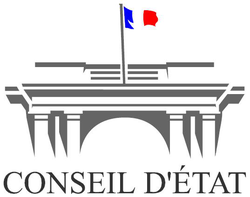Food for thoughts
May 22, 2018
Thesaurus : Doctrine
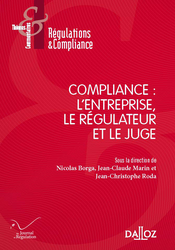
Référence complète : Ingall-Montagnier, Ph., La compliance entre extra-judiciaire et émergence du juge, in Borga, N., Marin, J.-Cl. et Roda, J.-Cl. (dir.), Compliance : l'entreprise, le régulateur et le juge, Série Régulations & Compliance, Dalloz, 2018, pp. 149-153.
Lire une présentation générale de l'ouvrage dans lequel est publié l'article.
Consulter les autres titres de la Série dans laquelle est publié l'ouvrage.
May 22, 2018
Thesaurus : Doctrine

Référence complète : Zolynski, C., Compliance et droit des données personnelles in Borga, N., Marin, J.-Cl. et Roda, J.-Cl. (dir.), Compliance : l'entreprise, le régulateur et le juge, Série Régulations & Compliance, Dalloz, 2018, pp. 129-136.
Lire une présentation générale de l'ouvrage dans lequel est publié l'article.
Consulter les autres titres de la Série dans laquelle est publié l'ouvrage.
May 22, 2018
Thesaurus : Doctrine

Référence complète : Granier, C., Dirigeants, associés et compliance, in Borga, N., Marin, J.-Cl. et Roda, J.-Cl. (dir.), Compliance : l'entreprise, le régulateur et le juge, Série Régulations & Compliance, Dalloz, 2018, pp. 227-234.
Lire une présentation générale de l'ouvrage dans lequel est publié l'article.
Consulter les autres titres de la Série dans laquelle est publié l'ouvrage.
May 22, 2018
Thesaurus : Doctrine

Référence complète : Boursier, M., E., Droit pénal des affaires internationales et compliance : compétences territoriales et extraterritorialité, in Borga, N., Marin, J.-Cl. et Roda, J.-Cl., Compliance : l'entreprise, le régulateur et le juge, coll. Régulations & Compliance, Dalloz, 2018, pp. 37-43.
Lire une présentation générale de l'ouvrage dans lequel est publié l'article.
Consulter les autres titres de la Série dans lequelle est publié l'ouvrage.
May 22, 2018
Editorial responsibilities : Direction of the collection "Regulations & Compliance", JoRC & Dalloz

► Référence complète : N. Borga, .J.-Cl. Marin., J.-Ch. Roda (dir.), Compliance : l'entreprise, le régulateur et le juge, Journal of Regulation & Compliance et Dalloz, coll. Régulations & Compliance, 2018, 264 p.
____
📝Lire la table des matières de l'ouvrage.
📚Voir les ouvrages parus et à paraître dans cette collection.
_____
► Lire une présentation des articles contenus dans cet ouvrage⤵️ :
🕴️ Amico, Th., La convention judiciaire d'intérêt public ou la compliance comme moyen de lutte contre la récidive.
🕴️Audit, M., Les lois extraterritoriales américaines comme facteur d'accélération de la compliance.
🕴️Augagneur, L.-M., L'efficacité des programmes de compliance : l'exemple du droit de la concurrence.
🕴️Baller, S., La gestion d'un audit de compliance ? Limites et perspectives.
🕴️Besson, V., L'entreprise et l'élaboration d'un programme de compliance.
🕴️Boulon, O., Compliance et régulation financière : le rôle de l'Autorité des marchés financiers.
🕴️Du Pontavice, V., Expérience de compliance : mener un audit environnement.
🕴️Frison-Roche, M.-A., Entreprise, Régulation, Juge : penser la compliance par ces trois personnages.
🕴️Frison-Roche, M.-A., Compliance : avant, maintenant, après.
🕴️Granier, C., Dirigeants, associés et compliance.
🕴️Ingall-Montagnier, Ph., La compliance entre extra-judiciaire et émergence du juge.
🕴️Lenoir, N., Les lanceurs d'alerte, une idée neuve en Europe.
🕴️Marin, J.-C., La compliance, un progrès.
🕴️Morel-Maroger, J., La compliance financière, les enseignements de l'affaire BNP Paribas.
🕴️Mossé, M., Le juriste au cœur du devoir de vigilance.
🕴️ Parance, B., Une illustration d'une démarche de compliance en droit de l'environnement : le cas Michelin devant le Point de contact national France.
🕴️Rebeyrol, V., La compliance : le rôle de la charte éthique.
🕴️Roda, J.-Ch., La compliance en droit américain : le régulateur, l'entreprise et le juge.
🕴️Schiller, S., La compliance extra-financière les risques de contradictions de domaines d'application.
🕴️Stirn, B., Le juge administratif et la compliance.
🕴️Zolynski, C., Compliance et droit des données personnelles.
________
May 22, 2018
Publications

♾️ suivre Marie-Anne Frison-Roche sur LinkedIn
♾️ s'abonner à la Newsletter MAFR Regulation, Compliance, Law
____
► Référence complète : M.-A. Frison-Roche, "Compliance : avant, maintenant, après", in N. Borga, J. -Cl. Marin et J.-Ch. Roda (dir.), Compliance : l'entreprise, le régulateur et le juge, Série Régulations & Compliance, Dalloz, 2018, p. 23-36.
____
____
🚧 Lire le document de travail sur la base duquel s'appuie l'article
🚧 Read the working paper on which the article is based : Compliance : Before, Now, After.
____
📝Lire l'autre article publié par Marie-Anne Frison-Roche dans cet ouvrage : Entreprise, Régulateur, Juge : penser la compliance par ces trois personnages.
______
► Résumé de l'article : Autant l'admettre. Parce que devant des règles de "Compliance si nombreuses et si disparates l'on a tant de mal à s'y retrouver, l'on est contraint à partir dans des directions si changeantes, que nous nous consolons de leur poids, de leur coût et de l'incompréhension que nous en avons en disant que la "Compliance" est "complexe" et "transdisciplinaire", comme si les mots compliqués pouvaient masquer notre désarroi. Mais la "Compliance" n'est pas un cataclysme, une bombe envoyée par les américains pour anéantir l'Europe, la nouvelle forme d'une Guerre froide en habits juridiques ; c'est une façon de voir des choses qui vient de loin, avec une cohérence qui lui est propre et qu'il faut avant tout comprendre. Pour mieux s'y déployer.
Si l'on comprend d'où vient ce nouveau corpus qui contraint aujourd'hui les entreprises à prouver qu'elles prennent effectivement en charge la concrétisation de certains buts qui les dépassent, notamment la lutte contre le blanchiment d'argent, la fraude fiscale, mais aussi la lutte contre la vente des êtres humains ou la lutte pour la préservation de la nature et de la planète, alors l'on peut continuer l'histoire, dans une nouvelle alliance entre certaines entreprises et les autorités publiques.
En effet, toutes les entreprises ne sont pas visées par une telle internalisation de "buts monumentaux" en leur sein. Une entreprise ordinaire a quant à elle vocation à se développer pour réaliser un but qui est le sien. Le système de Compliance ne peut concerner que des "entreprises cruciales". S'il doit y avoir changement de projet poursuivi par l'entreprise, cela ne peut tenir qu'à sa "position" dans un système. Cette position peut avoir une source objective (entreprise systémique) ou une source subjective, parce que l'entreprise veut concrétiser ces buts globaux car elle veut être "responsable". Dans ce cas, l'entreprise supporte alors la charge de preuve qu'un tel discours de responsabilité nouvelle correspond à un comportement et à une culture effective. Le poids des règles existe déjà aujourd'hui. Et c'est encore comme cela qu'aujourd'hui d'une façon négative et passive que la Compliance est perçue, par ceux qui la "subissent" (entreprises), voire par ceux qui l'appliquent (autorités publiques).
La transformation vers une "culture de confiance, c'est l'enjeu d'un passage entre aujourd'hui et demain. En effet demain, c'est une relation de confiance qui pourrait se construire entre ces entreprises-là et les autorités publiques, parce qu'elles partageaient les informations (enjeu systémique), parce qu'elles seraient d'accord sur les buts monumentaux (tous centrés sur la protection des êtres humains, que le seul fonctionnement marchand ne peut produire, que les seuls États ne peuvent assurer).
En cela, la "Compliance" est avant tout un pari, celui de la place des êtres humains sur des marchés mondialisés.
____
► English Summary of this article. We have to admit, because we find it difficult to find ourselves in front of so numerous and disparate rules, going in all directions and constantly changing, we console ourselves with their weight, their cost and our misunderstanding by affirming that Compliance is "complex" and "transdisciplinary", as if complicated words could mask our disarray. But "Compliance" is not a cataclysm, a bomb sent by the Americans to annihilate Europe, the new form of a Cold War in legal dress, it is a way of seeing things that comes from afar, with a coherence of its own and which must first be understood.
If one understands where this new corpus comes from, which now obliges companies to prove that they effectively take on the fulfillment of certain goals that go beyond them, notably the fight against money laundering, tax evasion , but also the fight against the sale of human beings or the struggle for the preservation of nature and the Earth, then we can continue the story.
Indeed, not all companies are targeted by such internalization of "monumental goals" within them." An ordinary enterprise is destined to develop itself in order to achieve a goal which is its own. The concern of these goals can only be for the "crucial enterprises. "If there is to be a change in the corporate project, then it can only depend on its" position "in a system, a financial, economic, social, global system, or because it has itself decided that it would be so. The company then bears the burden of proof that such a discourse of new responsibility corresponds to a behavior and an effective culture. The weight of the rules already exists today. And it is for the moment that now, in a negative and passive way, Compliance is perceived, by those who "undergo" it (companies), even by those who apply it (public authorities).
The transformation towards a "culture of trust" is the issue between today and tomorrow, because tomorrow, it is a relationship of trust that could be built between these companies and the public authorities, because they would share information (systemic issue), because they would agree on the less technical monumental goals (protection of human beings issue).
In this, "Compliance" is above all a bet, that of the place of human beings in globalized markets.
____
Consulter les autres titres de la Série dans laquelle est publié l'ouvrage.
May 22, 2018
Thesaurus : Doctrine

Référence complète : Morel-Maroger, J., La compliance financière, les enseignements de l'affaire BNP Paribas, in Borga, N., Marin, J.-Cl. et Roda, J.-Cl. (dir.), Compliance : l'entreprise, le régulateur et le juge, Série Régulations & Compliance, Dalloz, 2018, pp. 69-78.
Lire une présentation générale de l'ouvrage dans lequel est publié l'article.
Consulter les autres titres de la Série dans laquelle est publié l'ouvrage.
May 22, 2018
Thesaurus : Doctrine

Référence complète : Mossé, M., Le juriste au cœur du devoir de vigilance, in Borga, N., Marin, J.-Cl. et Roda, J.-Cl. (dir.), Compliance : l'entreprise, le régulateur et le juge, Série Régulations & Compliance, Dalloz, 2018, pp. 215-225.
Lire une présentation générale de l'ouvrage dans lequel est publié l'article.
Consulter les autres titres de la Série dans laquelle est publié l'ouvrage.
May 22, 2018
Thesaurus : Doctrine

Référence complète : Besson, V., L'entreprise et l'élaboration d'un programme de compliance, in Borga, N., Marin, J.-Cl. et Roda, J.-Cl., Compliance : l'entreprise, le régulateur et le juge, Série Régulations & Compliance, Dalloz, 2018, pp. 201-214.
Lire une présentation générale de l'ouvrage dans lequel est publié l'article.
Consulter les autres titres de la Série dans laquelle est publié l'ouvrage.
May 22, 2018
Thesaurus : Doctrine

Référence complète : Rebeyrol, V., La compliance : le rôle de la charte éthique, in Borga, N., Marin, J.-Cl. et Roda, J.-Cl. (dir.), Compliance : l'entreprise, le régulateur et le juge, Série Régulations & Compliance, Dalloz, 2018, pp. 119-141.
Lire une présentation générale de l'ouvrage dans lequel est publié l'article.
Consulter les autres titres de la Série dans laquelle est publié l'ouvrage.
May 22, 2018
Thesaurus : Doctrine

Référence complète : Boulon, O., Compliance et régulation financière : le rôle de l'Autorité des marchés financiers in Borga, N., Marin, J.-Cl. et Roda, J.-Cl. (dir.), Compliance : l'entreprise, le régulateur et le juge, Série Régulations & Compliance, Dalloz, 2018, pp. 167-192.
Lire une présentation générale de l'ouvrage dans lequel est publié l'article.
Consulter les autres titres de la Série dans laquelle est publié l'ouvrage.
May 22, 2018
Thesaurus : Doctrine

Référence complète : Lenoir, N., Les lanceurs d'alerte, une idée neuve en Europe, in Borga, N., Marin, J.-Cl. et Roda, J.-Cl. (dir.), Compliance : l'entreprise, le régulateur et le juge, Série Régulations & Compliance, Dalloz, 2018, pp. 103-118.
Lire une présentation générale de l'ouvrage dans lequel est publié l'article.
Consulter les autres titres de la Série dans laquelle est publié l'ouvrage.
May 22, 2018
Thesaurus : Doctrine

Complete reference: Amico, Th., La convention judiciaire d'intérêt public ou la compliance comme moyen de lutte contre la récidive, in Borga, N., Marin, J.-Cl. et Roda, J.-Cl. (dir.), Compliance : l'entreprise, le régulateur et le juge, Série Régulations & Compliance, Dalloz, 2018, pp. 79-90.
Read a general presentation of the work in which the article is published.
Consult the other titles of the Series in which the work is published.
May 18, 2018
Thesaurus : 03. Conseil d'Etat
May 15, 2018
Thesaurus : Doctrine

Référence complète : Moreaux, A., Comment se conformer au RGPD ?, in Affiches Parisiennes, mai 2018, pp. 1-3.
L'échéance du fameux Règlement général sur la protection des données approche. Pour Mounir Mahjoubi, secrétaire d'État au Numérique, « 2018 est l'année du RGPD » qui va entraîner un « véritable choc de sécurité » sur la toile. La mise en conformité avec le nouveau règlement européen sur le digital qui entre en vigueur le 25 mai est une question centrale pour les entreprises.
May 14, 2018
Thesaurus : Soft Law

Référence générale : CNIL, RGPD et TPE/PME : un nouveau modèle de registre plus simple et plus didactique
May 9, 2018
Thesaurus : Doctrine
Référence complète : Pillebout, L.-M., L'abus de minorité commis par un associé indivisaire, Revue Lamy Droit des Affaires, 2018, pp. 36-39.
April 27, 2018
Blog
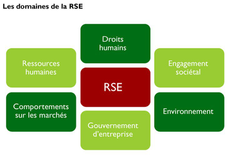
Le Conseil d'Etat a rendu public son Avis :
Parmi les très nombreuses dispositions de ce projet de loi de programmation et de réforme de la Justice", aussi abondantes que variées et que disparates, figurent un pan consacré aux peines.
Puisqu'il s'agit du Droit pénal, l'exigence de précision dans les termes est plus grande encore, impliquée par les principes constitutionnels de nécessité et d'interprétation restrictive.
Le titre qui donne de la cohérence aux dispositions en la matière est de "renforcer l'efficacité et le sens de la peine".
Le "travail d'intérêt général" peut être notamment effectué au sein d'une personne morale de droit privé chargée d'une "mission de service public" habilitée, que son but soit lucratif ou non .
Au regard des garanties constitutionnelles et internationales concernant le travail forcé, le Conseil d'Etat estime que la notion de "personne morale de droit privé chargé d'une mission de service public" est suffisamment explicite pour que les garanties soient satisfaites, dès l'instant que les décrets en Conseil d'Etat détermineront et les conditions de l'habilitation de ces personnes morales habilitées et les conditions de l'activité à laquelle la personne est condamnée.
Mais le projet de loi avait également visé "l'entreprise engagée dans une politique de responsabilité sociale de l'entreprise".
Et cela n'a pas été agréé par le Conseil d'Etat, non pas tant qu'il récuse l'idée d'une extension entre "l'intérêt général" et "l'intérêt collectif", mais qu'à juste titre soucieux de la pulvérisation des définitions des sortes d'intérêts que toutes sortes d'entités poursuivent, il demande à ce que celle-ci s'ancre dans ce qui serait la définition de référence : la loi du 31 juillet 2014 relative à l'économie sociale et solidaire.
Voilà les termes exacts de l'Avis (p.30) :
- En ce qui concerne l’identification des personnes morales pouvant proposer un travail d’intérêt général
107. Le Conseil d’Etat estime que la notion utilisée par le législateur de « personne morale de droit privé chargée d’une mission de service public » est suffisamment explicite et qu’il n’est pas nécessaire d’y ajouter la mention particulière d’une catégorie de personnes comprise dans cette notion. S’il le juge utile, le Gouvernement dispose d’autres moyens pour informer les personnes en cause de la portée du dispositif prévu à l’article 131-8.
- En ce qui concerne le champ de l’expérimentation
108. Le Conseil d’Etat propose de substituer à la notion, imprécise, d’« entreprise engagée dans une politique de responsabilité sociale de l’entreprise » celle, différente, de « personne morale de droit privé remplissant les conditions définies par l’article 1er de la loi n° 2014-856 du 31 juillet 2014 relative à l'économie sociale et solidaire et poursuivant un but d’utilité sociale au sens de l’article 2 de la même loi ». En effet, la catégorie de personnes morales de droit privé visée par cette nouvelle rédaction est à la fois mieux définie et plus adaptée à l’utilité sociale des travaux pouvant être proposés, conformément à l’objectif recherché par le Gouvernement. ......
Lire le commentaire ci-dessous.
V. par exemple le résumé fait au Dalloz du 19 avril 2018.
April 26, 2018
Thesaurus : 03. Conseil d'Etat
April 16, 2018
Thesaurus : Doctrine

Référence complète : Cresp, M., La comaternité en droit français, in Petites Affiches, avril 2018, n°76, pp. 14-21.
La comaternité correspond à l'établissement d'un deuxième lien de filiation maternel, l'enfant ayant alors deux mères indépendamment de toute adoption. Bien qu'étrangère au droit français, elle pourrait émerger sur notre scène juridique nationale, soit au travers de revendications sociales se basant sur notre droit interne (I), soit par le biais du droit international privé (II). Le présent sujet illustre la nécessité de réfléchir à un droit de la filiation cohérent et global, à défaut de quoi la réception, en droit, de la dissociation des figures de la maternité ne manquera pas de continuer à souler des difficultés.
April 16, 2018
Blog

It is about a particular case that one can rephrase the general questions. If the case is hot, it is even more important to return to the general questions, which are always colder (more boring, too).
Thus, Cambridge Analytica is a case of which everyone speaks a lot ... It is at the same time particular and very burning.
So we talk about it a lot, and with vehemence, and in a way often definitive, as well in attack as in defense.
For the prosecution, there are many advocacies, gathered for example in the Guardian's files.
For the defense, we find less. But one can read for example the article that has been published in early April 2018: Why (almost) everything reported about the Cambridge Analytica Facebook 'hacking' controversy is wrong.
The number of comments, and their more or less inflamed nature, in any case always definitive, does not mean anything in itself.
The regulators took the floor a little later, both in a more concrete way, the "group of 29" (bringing together all the European Regulators personal data) establishing the 11 April 2018 a working group on this subject and publishing April 10, 2018 new guidelines on the place that must be made to "consent".
But for the moment, if we loof at the media, it looks like a trial, because everyone claims to be entirely right and pretends that the other is entirely wrong. Trial to break the truth and virtue, say the accusers. Trial in witchcraft, says Facebook. And it's always up to us.
Because all this is probably due to the fact that we are no longer spectators: we are placed in the judge's position. The financial market was the first judge. It has already condemned. Without really trying to find out. This is because the public good of the financial markets is Trust, it is enough that one can even suspect the wife of Caesar, and so it is not really matter of truth of the facts and goof application of Rule of Law.
For the public opinion that we are, this is something else, because we could wait to know more. And we should, since we seek to remain a little attached to the "truth " of the facts and respect for the Rule of Law. However, this case is complex and is above all a matter of judicial analysis which will come and which we cannot lead ourselves, both in terms of the facts-which are complex-as well as the rules of law to be applied which are equally so.
What turns us into a court, an ordinary sociological phenomenon, is a new legal mechanism: the "whistleblower". By nature, it gives the bonus to the Attack
This logic of the legal mechanism of the whistleblower, a movement of fact to throw facts as one throws a buoy outside but one could also say stones on the firm that the insider denounces, logic today encouraged and protected by the Law, allows a person who knows something, most often because he participated, to let everyone know, without a filter. To denounce it. For the public good..
The successive texts on the whistleblower are nrms of a Compliance Law
The case is exemplary of this, since Facebook is "denounced" only in second place, behind Cambridge Analytica, but the notoriety and power of the first makes that it is hit first. French law in the so-called "Sapin 2 Act " of 2016 has ensured to protect the company denounced, but British and American Law are more violent, probably because they encourage more the private enforcement.
Temporality is therefore favorable to the attack. The time of the defense is always slower. It is usually the people in situations of weakness who suffer it: slowness of justice, justice outside courthouses, etc. With Compliance mechanisms, it is probably the very powerful who will live this. It is not a matter of rejoicing: the misfortune of some (here the difficulty of a company hasty "judged") does not console in any way the misfortune of others (the difficulty of ordinary beings accused or having only the right to protect themselves to reach concretely a judge and really get a judgment executed, even as they are in their right).
But if we go to general questions, since on the facts of this case we don't have the means to appreciate them, nor on the rules which apply to them, we cannot apply them in an adequate way until a court will have exercised its office?
However, the general perspectives highlighted by this singular case are two orders: Probationary order (I) and Accountability order (II).
Read below.
Frison-Roche, M.-A., Compliance Law, 2016.
On this notion, Frison-Roche, M.-A., From Regulation Law to Compliance Law, 2017.
April 11, 2018
Teachings : Droit de la régulation bancaire et financière, semestre de printemps 2017-2018
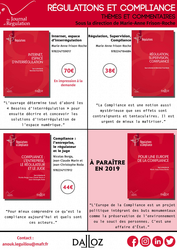
La Compliance, ne serait-ce que par ce terme même, est un mécanisme nouveau dans les systèmes juridiques européens, venant en convergence du Droit de la concurrence, du Droit financier et du Droit du commerce international.
Pour en mesurer l'importance et le développement, qui ne font que commencer, le plus probant est de commencer par sa dernière manifestation, à savoir la promulgation en France le 9 décembre 2016 de la loi dite "Sapin 2", suivant de peu la loi du 21 juin 2016 sur les abus de marché et suivie de peu par la loi du 27 janvier 2017 sur le devoir de vigilance des sociétés mère.
Voir l'ensemble de la bibliographie sur "Le Droit de la compliance"
Accéder aux slides servant de support à la leçon sur le Droit de la Compliance.
Consulter le plan de la leçon sur le Droit de la Compliance.
Retourner au plan général du cours.
Retourner à la présentation générale du Cours.
Consulter le Dictionnaire bilingue du Droit de la Régulation et de la Compliance.
Consulter la bibliographie générale du Cours.
Voir bibliographie élémentaire et approfondie ci-dessous.
April 4, 2018
Teachings : Droit de la régulation bancaire et financière, semestre de printemps 2017-2018

Par définition, le Droit de la régulation a l'ambition de ne pas simplement suivre les pouvoirs mais de les organiser en Ex Ante et d'en modérer l'usage en Ex Post, non seulement sur les marchés à travers une organisation des structures mêmes de certains marchés, mais encore à travers les structures des entreprises elles-mêmes, le Droit des sociétés étant de ce qui structure les entreprises. Ainsi, l'emprise des Autorités de régulation s'accroît, et cela par et grâce au Droit. Même lorsque des textes interviennent dans un sens libéral, comme en ce qui concerne le contrôle des montants proposés par les offreurs dans le mécanismes d'OPA ou d'OPE les directives de l'Union européennes demandant à ce que les Régulateurs ne contrôlent plus le caractère "équitable" de celui-ci, les juges admettent que par le visa de l'office général du Régulateur et la bonne information de l'actionnaire un tel contrôle soit maintenu, voire accru (cas Altice).
Le marché financier pénètre déjà dans cette régulation des pouvoirs sociétaires lorsque la société est "exposée" au marché financier par la cotation de ses titres sociaux, ou par le mécanisme plus général de financement de marché, les investisseurs titulaires de titres de créance demandant le bénéfice de la même transparence, voire des droits politiques analogues à ceux dont bénéficient les titulaires des titres de capital.
Mais les entreprises, à travers leur structuration sociétaire, sont définitivement "ouvertes" lorsque leur capital, c'est-à-dire non seulement leur richesse mais encore le pouvoir politique, est disponible sur ce marché financier spécifique qu'est le marché boursier. Le Droit régule alors les procédés de "prise de contrôle", tâche première de l'Autorité des marchés financiers, car si le pouvoir est par principe disponible, la "loi des volontés" ne peut suffire. L'on retrouve alors mais sous une forme plus nette les lois du capital, des volontés et des intentions.
Le Droit pose en effet le principe même des "offres publiques", les opérateurs devant tout d'abord révéler leur "intention" de prendre le contrôle, puis devant offrir à tout actionnaire une contrepartie soit en argent soit en titres.
Dans cet achat du pouvoir, le Régulateur boursier joue un rôle central, mais les textes européens dans une perspective plus libérale que précédemment ont posé qu'il n'a pas à contrôler le caractère équitable du prix que l'initiative de l'offre propose, concentrant davantage son pouvoir sur l'information due aux personnes "intéressées", ce qui est excède le seul cercle des titulaires des titres de capital, pour concerner le cercle de la catégorie qui commence à s'implanter dans le nouveau Droit des sociétés qui se dessine : les "parties prenantes".
Par la régulation des "prises de contrôle des sociétés ouvertes", l'on quitte de plus en plus l'idée d'une Régulation jouxtant l'économie administrée, parce qu'il s'agirait de la puissance étatique tenant les structures du marché financier afin que celui-ci soit fiable, pour aller vers une Régulation jouxtant la "Gouvernance" des sociétés qui sont exposées aux marchés financiers et qui à ce titre doivent admettre que leur fonctionnement politique doit être transparent, voire partagé avec ceux qui ont un intérêt financier avec ce fonctionnement, voire avec également ceux qui y ont un intérêt non directement financier.
Cette évolution est en cours.
Accéder aux slides servant de support à la leçon.
Consulter le plan de la leçon.
Retourner au plan général du cours.
Retourner à la présentation générale du Cours.
Consulter le Dictionnaire bilingue du Droit de la Régulation et de la Compliance.
Consulter la bibliographie générale du Cours.
Voir bibliographie élémentaire et approfondie ci-dessous.
April 4, 2018
Thesaurus : Doctrine
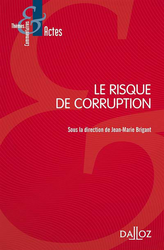
Référence complète : Jaune, R., L'Agence française anticorruption : une agence qui sanctionne, in Brigant, J.-M., (dir.), Le risque de corruption, Dalloz, 2018, pp. 15-20.
Consulter l'ouvrage dans lequel l'article a été publié.
Les étudiants de Sciences-Po peuvent consulter l'article via le Drive, dossier " MAFR- Regulation & Compliance"
April 4, 2018
Thesaurus : Doctrine

Référence complète : Gallois, A., La convention judiciaire d'intérêt public, in Brigant, J.-M., (dir.), Le risque de corruption, Dalloz, 2018, pp. 119-128.
Consulter l'ouvrage dans lequel l'article a été publié.
Les étudiants de Sciences-Po peuvent consulter l'article via le Drive, dossier " MAFR- Regulation & Compliance"
